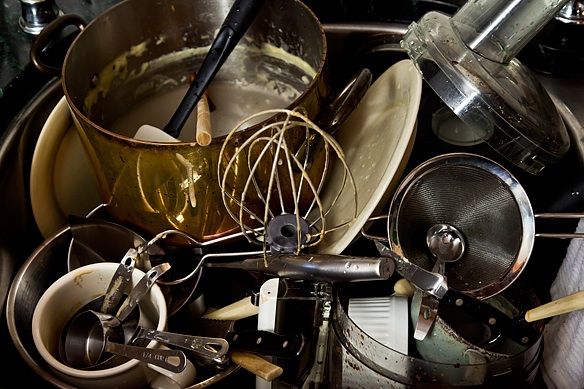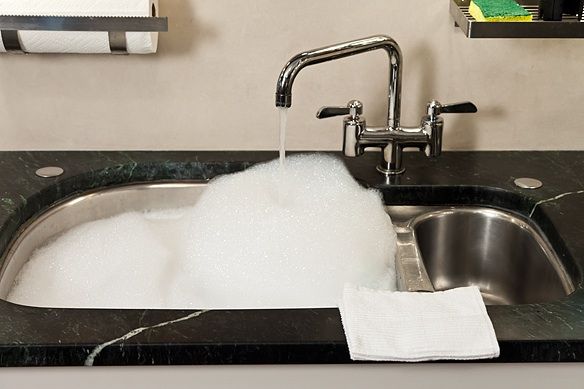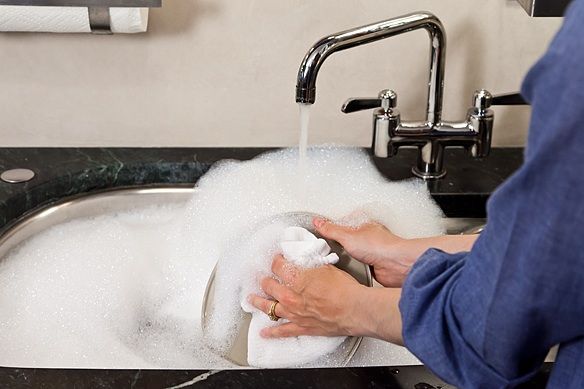
It's here: Our game-changing guide to everyone's favorite room in the house. Your Do-Anything Kitchen gathers the smartest ideas and savviest tricks—from our community, test kitchen, and cooks we love—to help transform your space into its best self.
Grab your copyPopular on Food52
91 Comments
Ginger N.
November 13, 2019
When cleaning baking equipment covered with batters or bread dough fill mixing bowls with cold water and let soak until flour rinses off in cool water. THEN add the soap and very HOT water. Hot water onto flour mixture residue makes plaster.
Tonis T.
October 26, 2017
Though I agree with the steps noted above, I like to wash as I work so I'm not leaving all the dishes till the end of the meal and freeing up counter space. I found a product called insink 4-1 which allows me to do this while conserving water and I'm not searching for sharp objects under soapy water.
Nancy
October 20, 2016
I found this column late and enjoyed seeing the (strict) tips. One supplement to the warnings about sponges...my understanding is that running them through the washing machine (to clean) and then microwave (about 2 min to sterilize) makes them safe to use. And change frequently.
http://www.eatright.org/resource/homefoodsafety/four-steps/wash/dos-and-donts-of-kitchen-sponge-safety
http://www.eatright.org/resource/homefoodsafety/four-steps/wash/dos-and-donts-of-kitchen-sponge-safety
Alex M.
May 13, 2016
I knew it! I've always washed like that except with gloves, and I have never trusted sponges, either. Also, here's a tip: use baking soda! If you're like me and you drink lots of tea and such this definitely helps. It works on anything.
Teresa L.
December 8, 2015
How about throwing out fat and oil left in the pans instead of washing down the drain with hot water and soap. Either when still warm but not too warm to melt the kitchen bin liner or when cold and solidified so can be scraped out.
Monika H.
March 21, 2015
Thank you Nancy for your input. My understanding was that hand dish soaps are not to be used in dishwashers since they produce suds. Is there a particular brand I should try and how much per load?
Nancy C.
March 21, 2015
Monika, I was appalled to find that a friend of mine who has lovely, old, patinated silver, routinely puts both it and fine china in the dishwasher. How does she get by with it? by using a very mild hand dish soap. This happens mainly after a dinner for 12 or more, and it fills up a whole DW load. The next load will be all pots and pans and other utilitarian and everyday things washed with regular DW detergent.
Monika H.
March 21, 2015
Has anyone out there discovered a dishwasher soap for gilt decorated glasses and fine porcelain. I've got the Bosch dishwasher but still end up doing a lot of hand-washing worried that the gilt will come off.
Nancy C.
March 21, 2015
If I did dishes every day with hot soapy water my hands would be a wreck, no matter how much lotion I might slather on them. No, I'll go with the dishwasher any time, but have the dishes well scraped before running it. I like to use the tablets from Cascade or Finish, the ones that have several components running in pretty swirls. Glassware especially comes out sparkly and grease-free, far better than from even the most meticulous hand washing. However, one a month or so, I like to hand wash everything. Forks in particular. Crud accumulates in tiny corners and on the inside surfaces of tines and there's nothing for it but going in there with a brush or even a fingernail pressing down on a slightly abrasive dish cloth. And once a month won't trash my hands!
Happy J.
September 7, 2014
When I was taught how to wish dishes properly in Home Ec class in high school we were told you start with the least dirty items such as glasses and cutlery (after rinsing of course). Otherwise all of your advice is spot on. Luckily I have a dish washer and only use these methods for things that can't go in.
Tatiana
August 5, 2014
No gloves? I could not stand the temperature of my hot water if I did not wear gloves.
jessica
July 27, 2014
So I have a plastic dish strainer that keeps this film of funk on it i have bleached it, soaked it in vinegar used baking soda, scrubbed it but yet when it dries it still has this film on it help
Amanda H.
July 27, 2014
I wish I had a solution for you, but it sounds like you've made every reasonable effort! It might need to be replaced, alas.
mylas
January 31, 2019
I’ve gotten good results with CLR Bath & Kitchen Foaming Action Cleaner. I was looking for something to remove hard water stains on sink fixtures and this does a great job. It also worked on my glass pourover coffee maker and cleaned the film, or more like crust, from my dish drainer. They sell it at our local grocery store and it even meets US EPA Safer Products Standards. Great stuff!
Em V.
May 27, 2014
How on earth do you not RINSE your plates out. Yum, you're eating delicious soap dish with added emulsified food particles.
Amanda H.
May 27, 2014
Hi Em -- I think you might have missed step 3, in which I wrote, "Rinse with very hot water and set in a dish drainer in a position that will allow the water to stream off of it." Agree that eating soap would not be fun!
Em V.
May 27, 2014
So I did. Serves me right reading while sleepy! Sorry. It's one of my pet peeves that so many people wash their dishes and don't rinse them :(
carole
April 20, 2014
A few years ago I retired and moved from a large, well applianced kitchen to an apartment with a small kitchen with no dishwasher. My co-ops dishwashing, green dishwashing soap is even better when I add a tablespoon of Borax. It softens the water and helps get everything sparkling clean. My glasses, put bottom down to air dry are spotless in short order! The first time I used Borax, I couldn't believe my eyes. During the past month I have been eliminating cleaning products that contain toxic chemicals and making my own solutions based on a wealth of recipes on Pinterest.com. Vinegar, baking soda, dish soap and lemon juice are mixed in various ways to clean. Essential oils like lemon or lavender added to most solutions give me a boost as I clean ..... Lovely, really. My sponge goes into the microwave every day. Once a week I clean the microwave with lemon juice/water in a bowl for 10 minutes on high followed by a wipe down. Life is good!
Wilda H.
November 27, 2013
When I have a lot of dirty greasy dishes I add a little javel to my hot water and let my dishes soak for a few minutes before I wash and rinse them very well.
Heather
November 10, 2013
My roomamte never fills the sink when washing dishes but instead uses one of those sponge soap dispensers. It appears that the bottoms of plates and bowls are not washed and after being risnsed never put upside down to drain. Food is also not scraped off the dishes or cookware before washing so that the food collects in the partially covered drain.
I on the other hand put my dishes in the sink in hotter than I can usually stand for more than a second. I soak everything for a couple of minutes and wash the cutlery first rinsing as the sink fills more for the other dishes. Rinsing with very hot water also ensures the water evaprates quickly so that drying is quick and doesn't require using a dish towel.
My roommate believes her method is just fine and any suggestions otherwise have been dismissed, yet I frequently have to rewash something that I pull from the drawer or cupboard before using it.
I on the other hand put my dishes in the sink in hotter than I can usually stand for more than a second. I soak everything for a couple of minutes and wash the cutlery first rinsing as the sink fills more for the other dishes. Rinsing with very hot water also ensures the water evaprates quickly so that drying is quick and doesn't require using a dish towel.
My roommate believes her method is just fine and any suggestions otherwise have been dismissed, yet I frequently have to rewash something that I pull from the drawer or cupboard before using it.
Heather
April 20, 2014
Oh dear. Apparently I did not proofread before posting that, as I see letters reversed, letters missing and just generally a poorly composed note. I wil blame lack of sleep. :o/
merilerole
September 28, 2013
Most dishwashers use water that's hotter than your bare hand could ever stand. And dries with a high heat. Less bacteria will survive that process than your fingers. Go for the high end appilances like Bosch. Your mother would be pleased.
ediblesprysky
August 9, 2014
Okay, I'll do that. A top-of-the-line stainless steel dishwasher is winging its way toward me as we speak. One tiny problem, though. My apartment has one wall (about 8 feet long) that comprises the kitchen area, including my stove, refrigerator, and all my cabinetry. I would immediately take a sledgehammer to my single under-counter cabinet in the pursuit of ever-cleaner dishes, but I think my landlord might object. Perhaps I could sneak the dishwasher into the communal laundry/bike storage room in the basement? I could share with the neighbors then--maybe if I ask real nice, they would even pitch in on the cost. Yes, I think this plan could work. I'll have to distract the super while the delivery guys bring it in and install it, but that's a small price to pay (perhaps literally, if it comes to bribes) to achieve truly clean dishes. Thank you for inspiring my ingenuity and showing me the way to true hygiene.




See what other Food52 readers are saying.